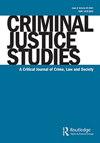Variations in community sentiment toward affirmative consent policies
IF 1.1
Q3 OPERATIONS RESEARCH & MANAGEMENT SCIENCE
引用次数: 0
Abstract
ABSTRACT University affirmative consent (AC) policies indicate that potential sexual partners must give a clear ‘yes,’ confirming that they wish to engage in sexual activity. A lack of resistance or a failure to say ‘no’ is not enough to convey consent. These policies are critically important to both men and women, as they convey whether a student has committed a crime; yet, little is known about sentiment toward such policies. In general, understanding community sentiment is important to ensure that legal actions have the support (and ultimately, compliance) of the people who must obey them. This study investigated the support of two communities: students who are directly affected by AC polices, and community members who are not. Participants indicated their support for affirmative consent policies, beliefs about the effectiveness of affirmative consent policies, and beliefs about whether they themselves or college students would be able to comply with the policies. Sentiment toward affirmative consent polices was high (positive), although agreement that college students would be able to follow these policies was lower. Further, there was variation in sentiment, with females and students having more positive sentiment compared to males and community members. Implications for policymakers and education about AC policies are offered.社区对肯定同意政策的情绪变化
大学的肯定同意(AC)政策表明,潜在的性伴侣必须给出明确的“是”,确认他们希望进行性活动。没有抵抗或不会说“不”并不足以表示同意。这些政策对男性和女性都至关重要,因为它们表明学生是否犯了罪;然而,人们对这些政策的态度却知之甚少。一般来说,理解社区情绪对于确保法律行动得到必须服从的人的支持(并最终遵守)是很重要的。本研究调查了两个社区的支持:直接受社区政策影响的学生和不受社区政策影响的社区成员。参与者表明了他们对肯定同意政策的支持,对肯定同意政策有效性的信念,以及他们自己或大学生是否能够遵守这些政策的信念。对积极同意政策的看法很高(积极),尽管认为大学生能够遵循这些政策的看法较低。此外,在情绪上也存在差异,女性和学生比男性和社区成员有更积极的情绪。本文提出了对政策制定者和交流政策教育的启示。
本文章由计算机程序翻译,如有差异,请以英文原文为准。
求助全文
约1分钟内获得全文
求助全文
来源期刊

CRIMINAL JUSTICE STUDIES
OPERATIONS RESEARCH & MANAGEMENT SCIENCE-
CiteScore
2.80
自引率
5.60%
发文量
17
期刊介绍:
Criminal Justice Studies, a quarterly refereed journal, publishes articles that deal with substantive criminal justice and criminological issues. The journal welcomes all articles that are relevant to the issue of criminal justice, as well as those that may be outside the field but have relevancy to the topic of criminal justice. Articles that cover public administration, issues of public policy, as well as public affairs issues are welcome. The journal also publishes relevant literature reviews, research notes and summary reports of innovative research projects in criminal justice. Qualitative and quantifiable articles are sought mainly from academics and researchers in the field, though articles from professionals will also be considered.
 求助内容:
求助内容: 应助结果提醒方式:
应助结果提醒方式:


